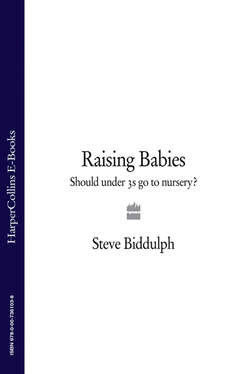Читать книгу Raising Babies: Should under 3s go to nursery? - Steve Biddulph, Steve Biddulph - Страница 34
A woman who asks tough questions
ОглавлениеThe scene is a large national conference of women lawyers in Sydney, Australia, and the topic is a popular one – combining parenthood with a career. The speakers are all of one mind: ‘There is still much work to be done to overcome discrimination. It is tough being a professional woman and a mother as well.’ The convenor, thanking the morning’s speakers, adds her own exhortation: ‘Don’t let anyone tell you that you shouldn’t be working.’
Then, unexpectedly, a hand goes up in the audience. Heads turned to watch as a tall, bespectacled young woman is handed a microphone. ‘No one has ever told me not to work,’ she says, in a clear and thoughtful voice. ‘These days all the pressure we get is to work full-time and to have a successful career.’ She pauses to allow this to sink in. ‘What no one talks about is taking time out to care for our children. That’s the message young women never hear today.’ You could hear a pin drop.
The woman’s name is Cathleen Sherry. She is, in her mid-thirties, already a tenured lecturer in law. Sherry is unusual in her profession, because with a family of three young children, she has reduced her workload by two-thirds, including taking several years off work completely. In Australia, she is a voice of the generational shift within feminism. Since that moment at the conference, she has featured in many media stories, and has written a series of articles of her own. She is saying, loud and clear: ‘What about the children?’
Sherry had come through a conversion experience of her own. When preparing to start her family, she sought out older women lawyers whom she knew were combining family and full-time work. She assumed that she could find role models and mentors to show her how it was done. Instead, she got a huge shock. When these women opened up to her, their lives sounded like a nightmare. They told stories of putting weeks-old babies into daycare, battling exhaustion, failing to acquire mothering skills, having problems with breastfeeding, feeling miserable and conflicted. Some of the older women told her of destroyed marriages and adolescent children with serious problems. A few of her informants did their best to put a positive spin on it all, but others were frankly shattered. As Sherry said, ‘There was no one that I spoke with who gave me the feeling – this is how I would want my life to be.’ The blueprint she was looking for – happily combining family and full-time work – did not exist, at least not in the world of the law.
There was more. As a rights lawyer, often advocating for children in the courtroom, Sherry saw a contradiction. That the sacred cow of the 1990s, a woman’s right to do what she wanted, was a logical fallacy. The needs of every person in the family and community had to be considered together, and balanced against each other. She told one interviewer:
‘No one has an absolute right to a career – men or women. If you choose to have children, your major responsibility is to care for them properly, and if that affects your career, it affects your career. But no one wants to acknowledge this reality…There is more than a dollop of hypocrisy in the fact that men who spend excessive hours in the workplace and little time with their children are considered substandard parents and yet women who do the same are considered “supermums”.’
Sherry is tough on men too.
‘Childcare allows men to avoid responsibility for their children. Women have to pay for others to look after their children because men aren’t willing to cut back on their work hours to do their share of the parenting. If women go back to work, it should be men, not children, who alter their lives accordingly.’
Cathleen Sherry is a nuanced kind of feminist who thinks children have rights too, and she knows that there is more to life than what money can buy. She is also a strong believer in governments providing proper support to those vulnerable women – especially single mothers – who need financial support to care for their children properly. She does not see it as just that poorer women should be forced into the workforce, to the cost of their children’s nurture. As she points out, in most countries the law only requires a child care centre to have one carer for every five babies.
‘It is like having a mother on her own caring for quintuplets. One baby wakes and needs to be fed. Another is crying, needing comfort but has to wait; they all have to wait their turn for comfort, affection, cuddles, – all the things that babies need…In maternity hospitals, it is no longer the done thing to have newborn babies lined up in a nursery with a couple of nurses looking after them. That is seen as terrible. Mothers are strongly persuaded to have their babies with them 24 hours a day. Yet six weeks later is okay to put ten of them in a nursery with just two carers. It doesn’t make sense.’
